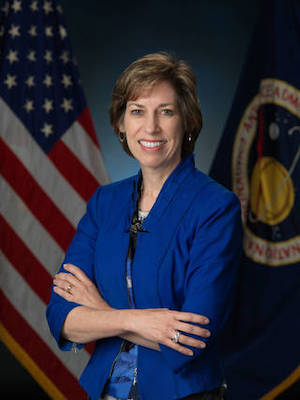By Martha Delgado
Engineer and astronaut Ellen Ochoa was the first Hispanic woman to go to space. Since her initial flight with the space shuttle Discovery in 1993, Ochoa has logged nearly 1,000 hours in orbit, serving shuttle missions STS-56, STS-66, STS-96, and STS-110.
Formerly director of the Johnson Space Center, Ochoa now serves as chair of the National Science Board, which establishes the policies of the National Science Foundation and serves as an independent body of advisors to both the President and Congress on policy matters related to science and engineering and education in science and engineering.
Ochoa’s numerous awards and honors include the Presidential Distinguished Rank Award for senior executives in the federal government and NASA’s highest award, the Distinguished Service Medal. In 2017, she was inducted into the United States Astronaut Hall of Fame. Ochoa’s achievements have been highlighted by textbooks, websites, and children’s books aimed at encouraging females and underrepresented minorities to pursue STEM fields.
In an interview with the National Women’s History Museum, Ochoa emphasized the importance representation had in her life. “I know that role models make a difference, and I take seriously that part of my career and life,” she said. “For young Hispanic women, there are few well-known women in STEM fields, so it’s even more important to let them know about the interesting and rewarding careers that they can pursue.”
Throughout her career, Ochoa has given more than 300 presentations related to her profession and the importance of STEM education. “I know it was important to me to see Sally Ride flying to space and to hear from other women engineers about their work,” Ochoa recalled. “And the fact that many students got to hear from me in person or through websites was very rewarding.”
In addition to receiving a bachelor’s degree in physics from San Diego State University, where she graduated Phi Beta Kappa, Ochoa also earned her M.S. and Ph.D. in electrical engineering from Stanford University. “I think ΦBK is something that stands for broadening perspectives and creating cultural connections,” she said. “I was glad to have that opportunity.”
Since high school, Ochoa always enjoyed math, eventually leading her to enroll in science classes when she began college. Her exploration of science and engineering came from her interest in understanding the different uses to which math was applied.
Ochoa recalled meeting with two professors and receiving different responses from them concerning her interest in advanced study in the sciences. While the electrical engineering professor was not interested in having her join his department, she said, the physics professor appreciated her interest and talked with her about the different career paths that were possible. “It’s important to look to those people who encourage and support you,” Ochoa advised. “Ignore the ones who are trying to discourage you. They don’t know you at all and are basing their reaction on who they picture as a scientist or engineer.”
In a field with almost no other women of Hispanic heritage, Ochoa had to adapt to not being around other people like herself. The support she received from early supervisors helped motivate her to persevere. In a Forbes article, Ochoa detailed how she navigated any feelings of inadequacy or self-doubt from imposter syndrome. “I’ve sometimes doubted whether I would do well in a particular class or job — the only way I knew how to deal with that was just to work hard and try to do the best that I could,” she said.
Ultimately, Ochoa encourages those interested in going into STEM fields to following where their ability and passion lead them and to investigate the many possibilities for future careers. “We need people’s ideas,” Ochoa commented. “There is so much out there whether solving problems or discovering new knowledge or developing new products. There are so many ways people can contribute to STEM.”
Higher education in the liberal arts and sciences is important to Ochoa as the variety of degrees offered, including those in STEM, make an enormous impact in the world. “I can’t imagine the world without that curiosity, enthusiasm, and desire to expand our knowledge base,” she said.
Martha Delgado earned her bachelor’s degree in creative writing from UC Riverside, where she was inducted into Phi Beta Kappa in May 2019. UC Riverside is home to the Iota of California chapter of Phi Beta Kappa.




